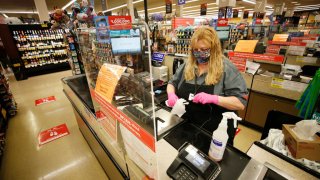
Hazard pay for some essential workers is coming to unincorporated areas of Santa Clara County in 30 days.
On Tuesday, the county Board of Supervisors voted to temporarily mandate large grocery stores and pharmacies to provide an additional $5 in hourly pay to employees on top of their regular wage.
"This ordinance advances a significant public purpose that seeks to compensate certain essential workers for facing increased risks and incurring increased costs during the pandemic in order to ensure that they continue to have stable and reliable access to food, medicine and other daily necessities of daily lives," Supervisor Susan Ellenberg said.
The boost in pay would last 180 days or until the county's COVID-19 public health emergency is terminated.
The new mandate applies to grocery stores and pharmacies with more than 300 employees nationwide and at least 15 employees in unincorporated areas of the county. It also applies to franchises that own at least 10 grocery or drug stores in the state.
The approved legislation is a scaled-back version of an original proposal from January that would've applied to every city in the county, except San Jose, and would've included large-chain restaurant workers.
Board President Mike Wasserman recused himself from the vote because of his financial ties to McDonald's.
Local
The $5 boost and the length of the hazard pay from the original proposal remain unchanged.
Pressure from business groups that represent grocers forced the county's hand -- a move Ellenberg found disappointing.
Get a weekly recap of the latest San Francisco Bay Area housing news. >Sign up for NBC Bay Area’s Housing Deconstructed newsletter.
"Contrary to the argument of some opponents, this is not special interest legislation," Ellenberg said. "The fact that this ordinance only addresses (certain grocery store and pharmacy workers) … but not all workers is not a reason to be concerned about motives. It is an incremental step to remedy some harm."
The most notable opposition came from the California Grocers Association, which has filed several lawsuits against California cities that enacted similar laws.
The organization argued the additional pay would force grocers to take cost-cutting measures like raising the price of goods or cutting employee hours, as well as closing stores.
"Unfortunately, the [hazard pay] would mandate grocery stores to provide additional pay beyond what is economically feasible, which would severely impact store viability and result in increased prices for groceries, limited operating hours, reduced hours for workers, fewer workers per store and most concerning, possible store closures," Tim James of the California Grocers Association said in a letter to the supervisors.
The Silicon Valley Chamber Coalition, the region's largest chambers of commerce, also organized against the ordinance -- arguing that pay boosts would result in lost jobs and worsen food insecurity.
The chamber coalition, comprised of 18 local chambers of commerce, touted its success in a monthly newsletter, saying the new changes "would have almost zero impact on businesses and workers in our community." To them, the better solution was to get employees vaccinated as soon as possible.
However, local labor groups, unions and community organizations argued that the ordinance was essential as employees risked the lives of loved ones and themselves to provide essential services to the community.
Jim Arby, director of strategic campaigns for United Food & Commercial Workers Union Local 5, said he didn't buy the argument that grocers couldn't afford the hazard pay.
"Kroger, which also owns QFC, Fred Meyers, Harris Teeter, and Ralphs, is touting a massive surge in profits -- $2 billion over 2 quarters in 2020, according to a report on the Brookings Institute's website. Albertsons, which owns Randalls, Safeway and Star Market made a profit of $871 million over three quarters in 2020, an explosive increase of threefold from the year prior," Arby wrote. "Make no mistake -- these companies are massively profiting off of the pandemic, but supposedly cannot afford to provide their employees with hazard pay of a few dollars in spite of their employees being at risk every day to do their jobs."
But Ellenberg noted that this ordinance ensured "air-tight enforcement … given limitations of the law." Ellenberg also asked county counsel to share the ordinance with the cities in the county and encourage them to adopt a similar ordinance as soon as possible.
"Consistency across the county would certainly be of value to employers, even those that feel burdened by the ordinance and would help us to be more broadly impactful on behalf of those who could truly use some extra support right now," she said.
With this hazard pay, the county joins other Bay Area cities like Oakland and San Jose, which was the first city in the county to approve hazard pay earlier this month.



